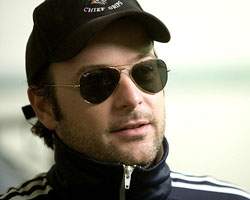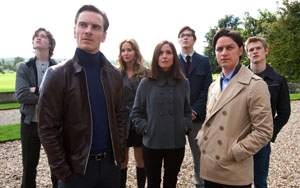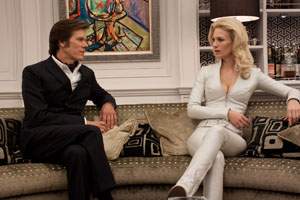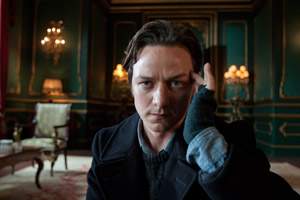
He made his feature film directorial debut in 2004 with LAYER CAKE, a crime thriller starring Daniel Craig. Refusing to be typecast, he followed up with romantic fantasy adventure STARDUST and last year’s well-received superhero comedy KICK-ASS, which starred Aaron Johnson and Nicolas Cage.
X-MEN: FIRST CLASS marks the director’s first foray into Hollywood, though in November 2010, on the film’s set at Pinewood Studios in London, it seems Vaughn has kept much of his crew of frequent collaborators with him. He sat down to discuss his vision for the project.

There was already a script, but we weren’t happy with it, so we rewrote it and put in a story and a structure that worked. I wanted to do a JAMES BOND meets X-MEN version; a classic 60s political thriller.
Do you suggest the politics of the era?
Yes - the whole thing’s set against the Cuban Missile Crisis. It’s set in 1962 and that forms the backdrop of all of it.
I remember watching THIRTEEN DAYS, which I thought was a great film, and that’s when I first found out about the Cuban Missile Crisis. In applying it to X-MEN, I just loved the idea of taking that notion and having a mutant trying to cause World War Three, because what we’re saying is that radiation caused mutancy.
It’s a classic BOND plot: Sebastian Shaw (Kevin Bacon) is the bad guy playing the Russians against the Americans, but we’re doing it with the Cuban Missile Crisis. Those are the movies I loved as a kid. So why not try again?

Filmmaking is filmmaking. I actually think it’s harder to make a movie for $2m than it is for $200m. Here you have plenty more people to help make it work. When we did KICK-ASS, there was no one around to back us up and we had no money. That’s definitely harder, I think.
It seems like you’ve kept your team together as well.
I’ve kept as many of them as possible. A lot of people I wanted to use were busy. The problem was, after KICK-ASS everyone rang me up to say, “I want to do this other film, is it alright?” And I said, “Yeah, yeah, I’ve got nothing coming up.” But I went to the premiere of KICK-ASS, soon after got a phone call that Fox wanted to meet, and then they offered me this. Half of my crew had already gone off to do other films. I was planning to take the whole summer off! I’ve had no holiday for two years! It’s the only aspect of the movie that does freak me out – the lack of time – but at the same time, I like a challenge!
What inspired the casting of James McAvoy and Michael Fassbender as your two leads?
Both of them are phenomenal actors. James, for me, was the obvious Professor X. He was the only guy on my wish list. For Magneto, there were a couple of people I was thinking of, and the studio did want him to be younger, but I’ve always been a big fan of Fassbender’s. I said, “Look, can I get Michael in for a screen test?” They weren’t sure, and they thought he was a bit too old for the part. But he came in and after two minutes it was like, “Wow.”

Well, they’re taking over from Ian McKellen and Patrick Stewart! What Bryan Singer did do was lay down some unbelievable casting. On the first X-MEN film, the casting was superb, and I thought I had to follow that.
Ironically, Professor X is a harder role to cast, because at the end of the day he’s sitting in a wheelchair, touching his temple and talking in his very boring, pious way. I needed an actor that could have fun with it, because here he’s running around – he’s got his legs and he’s learning. I loved the idea of having an actor that could, if we did a sequel to this when he’s in a wheelchair, still make it interesting. That’s why Patrick Stewart is great – he’s sitting in a wheelchair, but you’re still into it.
I think McKellen is such a brilliant old ham – he’s great, and he can read the Yellow Pages and you go, “Wow,” – and Magneto’s a juicier role, so I needed an actor that could bring what Ian brought to it, but here so even more. It’s very hard, if you’re an actor, to make it your role when so many things have been put in place. You don’t want to look like they’re doing a mimic or an impersonation.
What’s been the biggest challenge to pull together?
It’ll be the sequence we’re going to be shooting in two weeks time in Georgia. That’s the really big stuff. The final act of the film is one whole set piece, but on a different level. It’s big, but it’s contained. I think if you get too big, the audience can’t cope; they can’t figure out what’s going on. It’s a small playing field with a lot of big things happening.
How do you keep a handle on the ensemble cast?
Well every movie I’ve done has been a massive ensemble when you think about it. As a producer from LOCK, STOCK AND TWO SMOKING BARRELS and SNATCH, to a director with LAYER CAKE, STARDUST and KICK-ASS, they’re very multi-plotted and full of characters.
The trick is to balance it right and make sure everything’s interesting and that everyone complements each other instead of steals. And that normally comes together in editing. That’s the big challenge on this, is that I’ve got such a short time to edit the movie. I hope I can get the right rhythm and balance between all the different characters. But so far it is working.
What will make this film stand out?
What I can say is that what I’m doing, no one has done before in a superhero film. And it may be a disaster because it’s different – as I said, it’s BOND, it’s a political thriller. But it is an X-MEN movie, I haven’t turned my back on it, it’s just not like the other X-MEN movies, which I think is important. I think the series needed what BATMAN BEGINS did after all those BATMAN movies. I’m not saying this is going to be as good as BATMAN BEGINS, but it’s the same attitude.
How do you think younger audiences will react to the period setting?
Hopefully they’ll think it’s cool. Everything looked cool in the '60s. The suits are great, the music’s cool, the cars are cool. You want something different. Look at what INCEPTION did. It was like, hallelujah. I think audiences are bored with cookie cutting.
Have you got ideas in mind for sequels?
I have a few ideas, but I don’t like tempting fate. There are certainly seeds for a sequel, and the end of this should be making people gag for one.